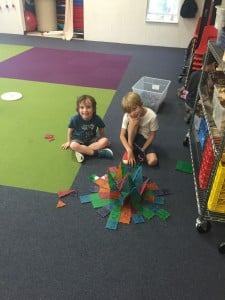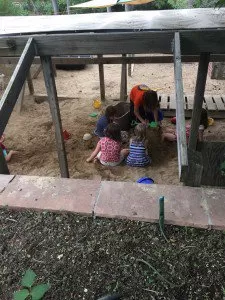Summer is a wonderful time to kick off the shoes, find a friend, or ten, and invent your own world. What are the kinds of things that happen internally and mentally when we are playing creatively and engaging with our peers? Are these the same skills we require in our “adult world” to function in our homes and offices? Think about what it takes to collaborate as a team of adults towards a common goal. We must be able to communicate a shared vision, take roles and responsibilities, remember shared “rules,” and create something out of nothing. Amazingly, PLAY, although looking like just fun, is much more complex and involves many of the same skills.
The understanding of PLAY’s developmental benefits is what inspires Bixby’s summer camp to be play-based. At Bixby, kids receive ample time, space, and materials to build, invent, and create worlds without any teachers telling them what to do. Our gym floor is a consistent building zone when gym games aren’t happening. The sandbox turns into a medieval castle on a regular basis, and the kindergarten room is filled with role-playing and dress-up.
The following bullet points are from Pete Gray and Lenore Skenazy’s article in the Wall Street Journal titled, “Child’s Play Is About More than Games” (http://www.wsj.com/articles/peter-gray-and-lenore-skenazy-childs-play-is-about-more-than-games-1409179516)
- Innovation and creativity. When children aren’t told what to do by a teacher, parent or coach, they have to figure out how to create their own fun and keep it going. That means play is continuously creative. There’s no better way to raise innovators than to allow and encourage play.
- Cooperation. In play with others, children learn to negotiate. They have to attend to one another’s needs—”Am I pitching too hard?” “Is she sick of being the troll?”—because if they are totally self-absorbed they know the other kids will quit and play will end. So they learn to cooperate, perhaps the most crucial of all skills we social creatures must learn.
- Self-control. To play, children learn they must follow the rules, allow others their turns, and control their impulses and emotions. Play may evoke a child’s anger when a playmate disagrees with or accidentally hurts him. And it may evoke fear when a child is chased by a child-eating dragon. But children must control those emotions to keep playing. They learn not to cry at a minor injury or throw a tantrum when they get upset. They learn not to give in to fear or tattle to an adult—because doing so would ruin the game.
- Paying attention. Can you think of any games where kids have to pay attention? That’s right, all of them. Pay attention to the ball, the cards, the rules for who can say what to the GreatMonkey King. Paying attention to details for love of the game prepares kids to pay attention to other things, like adverbs or the decimal point in math.
- Managing difficult tasks. Children at play are naturally drawn to tasks at the cutting edges of their abilities—not so easy as to be boring, nor so difficult as to be impossible. Whether scaling fences, building towers, creating make-believe worlds or playing videogames, players keep advancing to higher levels to maintain the sense of challenge.

- Learning to practice. Did you ever see a child do the same thing day in and day out? Build with blocks, draw Batman or jump rope? They’re trying to get it right. That’s practicing. It’s what we beg our children to do with their vocabulary lists and piano pieces: Get down to business, focus and work on something hard. The difference istheychoose the something.
- Solving problems and taking responsibility. In play, children must solve their own problems—emotional, social, physical or intellectual. In the other parts of a child’s life, adults jump in and make everything work. In play children are the adults. Play is practice for adulthood, because in play the children are in charge.



